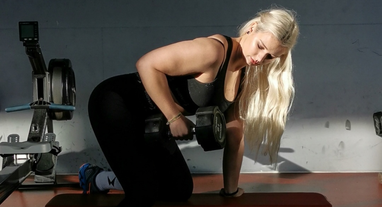Football training: the ultimate guide
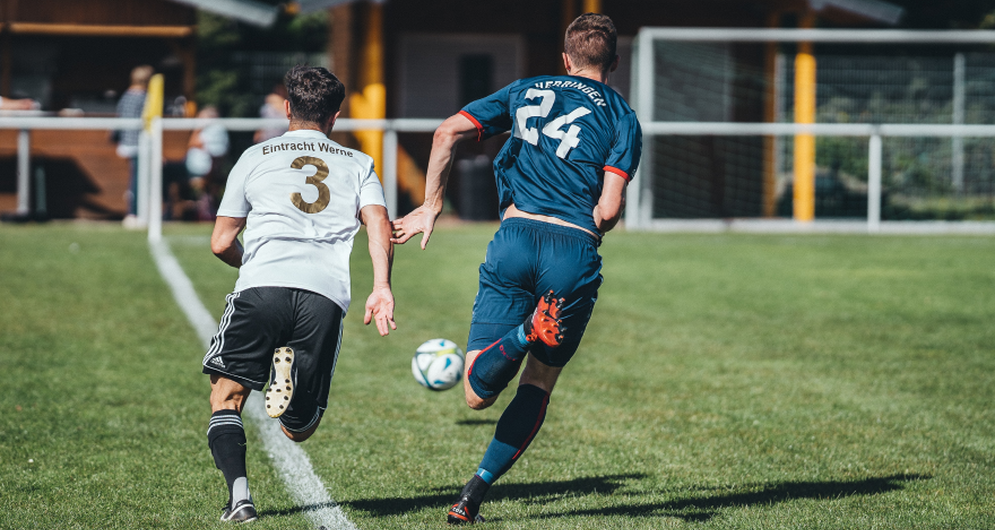
When it comes to sports, football is by far the most popular in the world. In 2018, over 3.2 billion people watched the World Cup, which is roughly half of the world’s population. The beautiful game is king in pretty much all of Europe, Asia, Africa, South America, Central America and the Middle East.
It’s also played by millions across thousands of different leagues at amateur, semi-pro and professional levels. Regardless of whether you’re in the top flight or a Sunday league player, you need to train hard, eat right and stay disciplined to achieve footballing greatness. Here, we’ll look at how football players train and give you some top football training exercises and drills to help build the strength, power, stamina, speed and skill you need to play at your best.
Why do football players need to train?
Playing football is a great way of staying fit and healthy, whether you’re part of a team or just having fun with friends. If you’re looking to get to that next level on the pitch, however, you’ll need to put in the hard work on the training ground. In a 90 minute game, a football player can run anywhere between 7-9.5 miles (11-15km) and needs to maintain a strong mental focus throughout. A regular training programme allows you stay fit enough, mentally and physically, to last a full game and continue improving technical skills and areas of weakness.
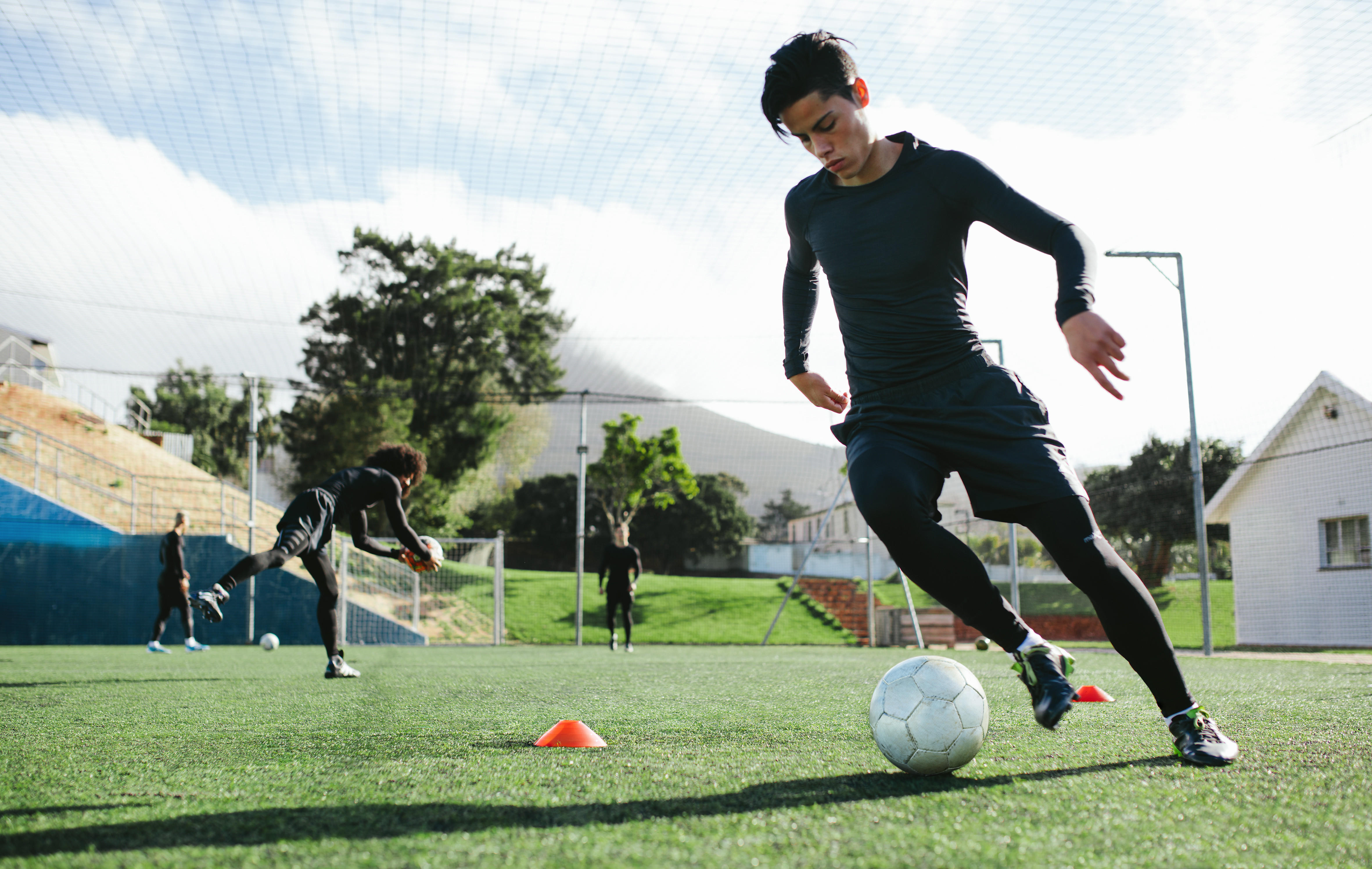
What is football training?
There are three areas of football training that are essential for the success of both the individual and the team as a whole: physical, technical and tactical.
Football training: physical
This kind of football training involves building cardio to get through matches and strength to run, jump, shoot and tackle with explosiveness and power. Exercises like running, HIIT and cycling are key, as well as resistance training (weightlifting), calisthenics, and flexibility and mobility training.
Football training: technical
The technical side involves lots of football training drills and exercises to develop skills like shooting, dribbling, passing, crossing, tackling and heading. Often, they’re specific to certain positions on the team. A defender, for example, might practice more tackling and heading than a striker, who’s likely to work more on their dribbling and shooting.
Football training: tactical
The theoretical aspect of the game — set pieces, formations, tactics, studying the opposition. Most of the time, tactical training will involve the whole team. On the training ground, it includes playing out different attacking and defensive scenarios. It can also occur in a classroom setting, where tactics are discussed and video footage of your squad and the opposition is analysed (although this usually occurs at higher levels of the game).
How often do footballers train?
A calendar year is split into 3 seasons for football players: pre-season, regular season and off-season. In pre-season and regular season, top professionals train 4-6 hours per day 5 times per week. As match day approaches, sessions will become less physically intense and focus more on tactics.
If you’re playing at an amateur level and have a job, kids and a social life etc. it’s going to be tough to match this kind of routine. Usually, a Sunday league team has one or two training sessions plus a match day each week. These sessions will cover physical, technical and tactical training, although to gain an extra edge you’ll need to use some of your own time. There are plenty of football training exercises you can do in a regular gym (which we’ll look at below) and a back garden or local park is ideal for setting up some solo football training drills.
On days off, it’s all about rest and recovery. It’s important not to over train the body. You don’t want to miss the big game because of injury or fatigue.
What football training equipment do you need?
For a top solo football training session in the garden or park, you can’t go wrong with these duffle bag essentials:
-
Cones
-
Agility ladder
-
Hurdles
-
Ball rebounder
-
Slalom poles
-
Training boots
Obviously, you’ll need a football, too!
What are the best football training drills?
Football training drills are used by teams of all different levels and are a key part of any training session. They’re designed to sharpen all aspects of the game, from speed and power to set pieces and shooting. Professional and amateur coaches alike are making up new football training drills constantly, although there are some that are tried and trusted all over the world.
Here’s a great solo football training drill to get you started, using most of the football training equipment listed above:
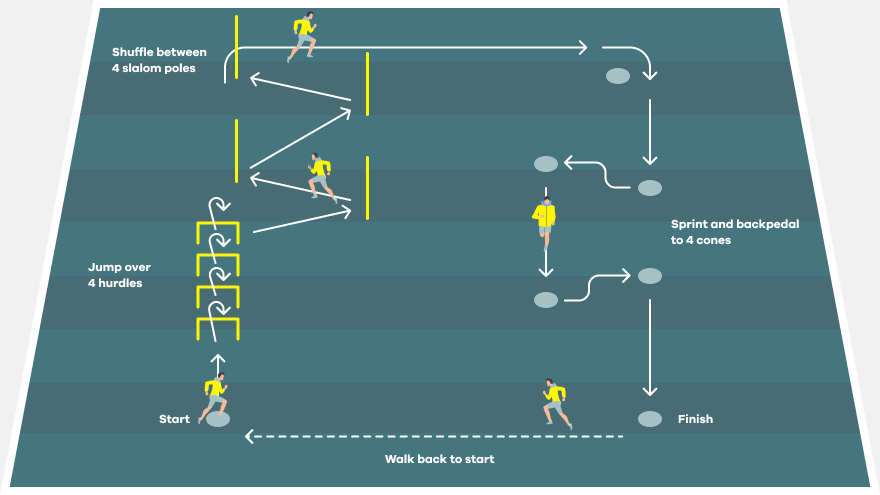
What are the best football training exercises?
On the field, you need to be able to stand your ground during physical duels, so strength straining can be very useful. A well-planned schedule is key, however. You don’t want to go into a session or match with muscle ache. In addition, it’s important that muscle mass doesn’t get in your way. Focus on getting lean and building endurance in the muscles by using low to medium weights and performing a larger number of repetitions.
The best lower body exercises for football
It goes without saying that footballers need strong, flexible legs to cover almost all aspects of the game. There are many exercises that work towards building power and endurance in the legs, although these are our footballing favourites.
Squats
Great for strengthening the lower body, squats hit the glutes and quadriceps as well as engaging the calves, hamstrings, hip muscles and core. They also help to strengthen the ligaments, tendons and bones around the leg muscles, which can lower the chances of injury, and gain endurance, balance and power on the pitch.
How to squat:
-
Rest a barbell on your rear shoulders/upper back.
-
Set your feet hip width apart.
-
Bend your knees to a 90° angle, making sure your weight is in your heels.
-
Slowly sit back, keeping your head upright.
-
Hold for around 5 seconds.
-
Rise up, press through your heels and return to the starting position.
Use a weight that allows you to perform 15-20 reps. If you’re new to squat exercises, start off without using weights to practice the right form and ensure you don’t injure your knees and spine.
Lunges
A game of football involves lots of quick starts and stops. Aside from developing single leg strength, lunges can help you accelerate and decelerate faster, giving you an edge over the competition.
How to lunge:
-
Place your feet hip-width apart and point your toes to the front.
-
Stride forward with one leg.
-
Allow both knees to bend until your front knee is at a 90° angle.
-
Press into your front knee and push back to the starting position.
-
Switch front legs and repeat.
Do this 15-20 times. If you want to make it more of a challenge, hold a dumbbell in each hand or a barbell over your shoulders.
The best core exercises for football
A strong core is essential for stability, flexibility and balance. When you’re dribbling or sprinting down the wing, you need to be able to take hits and shoulder tackles. These are some great exercises for the lower back, abs and oblique (side ab) muscles.
Superman
The superman strengthens the erector muscles that run along the spine. It promotes good posture and reduces the risk of injury by training stabiliser muscles like the abs and lower back.
How to superman:
-
Lie on your belly and keep both arms stretched out above your head with your nose pointing to the floor.
-
Tighten your back, abs, and glutes so that your legs, shoulders and arms are off the ground.
-
Lower yourself back to the starting position in a controlled manner.
-
Repeat 8-12 times.
Plank
The plank position fires up the abs and glutes to help improve posture, balance, coordination, alignment and overall strength. In particular, it hits the transverse abdominis (the deepest abdominal muscles responsible for stabilising the lumbar spine and pelvis) and the rectus abdominis (the muscles that give you a six pack and are involved in jumping and kicking).
How to plank:
-
Lie on your stomach.
-
Support your upper body on your forearms or hands.
-
Place your feet vertically on the floor and lift your stomach, hips and knees so that your body forms a straight line.
-
Tighten your abs and glutes.
Hold the position for as long as you can and feel the burn!
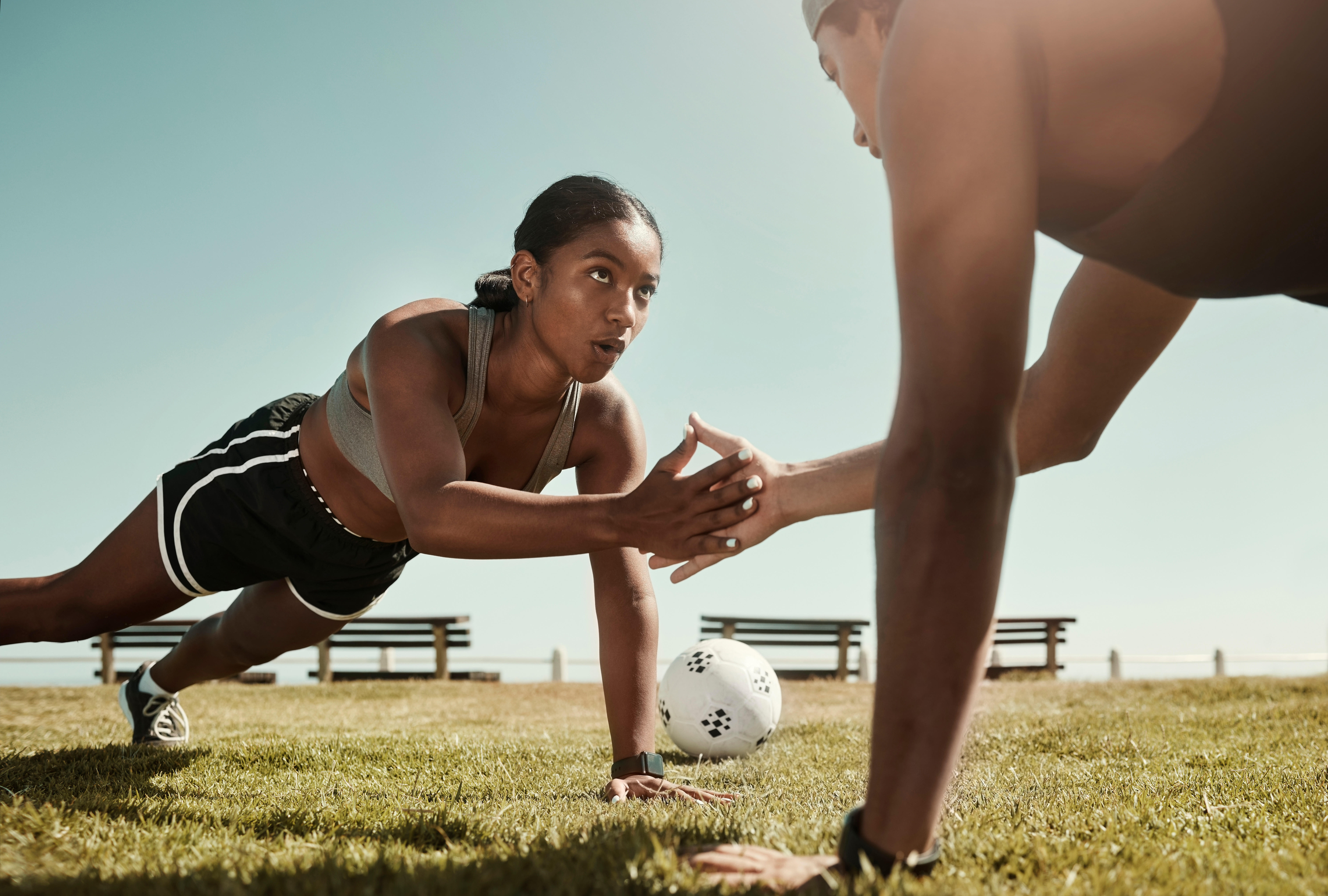
The best plyometric exercises for football
A plyometric exercise is anything that involves fast and powerful movement. They help to improve dexterity, coordination and explosiveness while boosting stamina and metabolism. In addition, plyometric exercises rapidly stretch your muscles, allowing you to move more efficiently.
Dry skating
These will help build agility and balance on the pitch, where switching direction fast and dodging tackles efficiently can make all the difference.
How to dry skate:
-
Balance on your left foot and jump as far to the right as possible.
-
Land on your right foot with a slightly bent knee and stand for about a second.
-
Now jump to the left.
-
Repeat 8-12 times.
Box jumping
The perfect exercise for gaining power in your jumps, whether you’re a defender clearing crosses or an attacker heading the ball into the top corner.
How to box jump:
-
Stand in front of a sturdy plyometric box (most gyms are equipped with various sizes).
-
Power jump onto it with both feet.
-
Get off and start again.
-
Repeat 8-12 times.
What are the best foods and supplements for football?
A solid nutrition and supplement plan is essential for football players to perform at their best. A lack of nutrients can make it difficult to build muscle and make it through a game without fatigue or cramping. Plenty of vegetables, lean red meats, turkey, chicken, nuts, seeds, wholegrains and carbs ensure your body is fuelled and ready for game day.
There are also certain supplements that are ideal for enhancing performance, maintaining energy levels and aiding recovery. You can use supplements expertly designed for pre, during and post-match periods. Others are good for general everyday use, like protein, which supports the growth and maintenance of muscles.
Win, lose or draw, here you’ll find some of the best supplements to take before, during and after the game.
The best pre-match football supplements: pre-workouts
A quality pre-workout supplement can really help you max out your performance. They typically contain ingredients like vitamin B12, which contributes to the reduction of tiredness and fatigue, and caffeine to increase alertness and improve concentration. Our Body&Fit BF10 Pre-workout contains 10 active ingredients, including taurine, beta alanine and AstraGin®. Enjoy roughly 30 minutes before kick-off for a potent boost of focus and energy.
The best pre-match football supplements: creatine
One of the most popular and widely studied supplements in the world, creatine is proven to increase performance during short-term high-intensity exercise. It does so by helping the body produce adenosine triphosphate (ATP), which is responsible for providing energy for muscle contractions. This makes it great for sports involving fast and explosive movements like football. Try adding our Body&Fit Creapure® Creatine in your pre-workout shake, smoothie or drink.
The best intra-match football supplements: isotonic drinks
During long, intense matches, it’s essential to stay hydrated and replenish electrolytes lost through sweat. Electrolytes, like magnesium, sodium and potassium are found in lots of different foods, although isotonic drinks are perfect for pitch-side hydration and preventing muscle cramps. This Body&Fit Isotonic Sports Drinks supports endurance performance with 32g of easily digestible carbohydrates per serving.
The best intra-match football supplements: energy gels
Especially good for those tough games that go into extra time or penalties, energy gels can give you an extra boost when you need it most. Our Body&Fit Rocket Fuel Energy Gels are easily digestible and contain vitamin B12 to reduce tiredness and fatigue plus 40mg of caffeine to help you focus on finding the top corner.
The best post-match football supplements: protein
Two types of protein are particularly useful for football players: whey isolate and casein protein.
Unlike other forms of whey like concentrate and hydrolysate, whey isolate is processed to remove all the lactose and fat and usually contains around 90% protein. This makes it very pure and easy for the body to digest quickly, so it’s great for taking soon after the game. Go for a premium formula like our Body&Fit Whey Isolate XP, which is loaded with 25g of protein per serving. Alternatively, you can quench your thirst in the changing rooms with the light and refreshing Body&Fit Juicy Whey Isolate.
Where whey isolate has a fast rate of digestion, casein protein takes around six to seven hours to digest fully, providing the muscles with a steady supply of amino acids over an extended period. It’s best to take casein protein before bed to support muscle growth and recovery while you sleep. Our Body&Fit Micellar Casein Perfection (micellar casein is considered the gold standard of casein protein powder) is packed with 20g of slow-digesting protein per serving, specially designed to help you grow and maintain muscle.

You know what you want to work on (physical, technical, or tactical?); you’ve got your football training equipment, ideas and drills at hand; and your supplements are at the ready. Now, it’s time to put it all into practice. As we’ve seen, it takes a lot of hard work and dedication to get to that next level in football, but even if you’re playing for fun, it’s always satisfying to get better, fitter and more confident on the pitch. Check out our workouts page for more inspiration and don’t forget to mix up your routine, avoid injury by not overtraining, and keep channelling your inner Ronaldo to find your footballing fit.
#FINDYOURFIT



